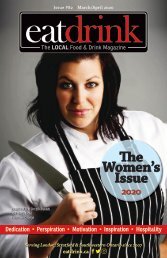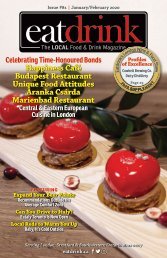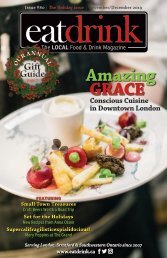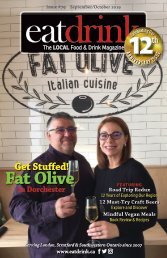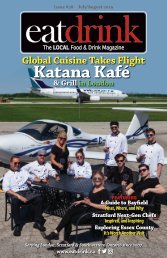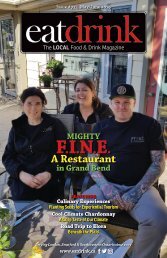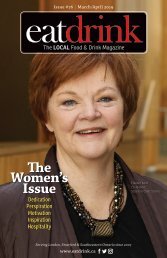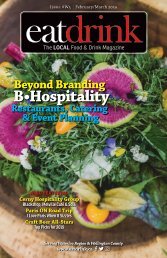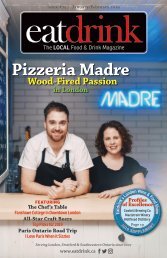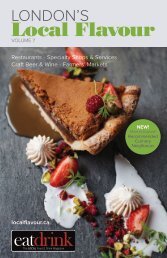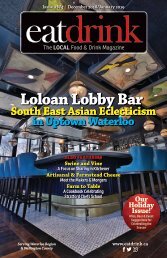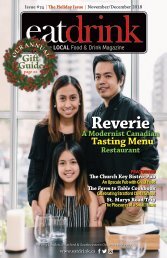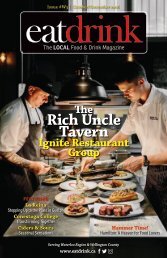Eatdrink #42 July/August 2013
The LOCAL food and drink magazine serving London, Stratford and Southwestern Ontario since 2007
The LOCAL food and drink magazine serving London, Stratford and Southwestern Ontario since 2007
Create successful ePaper yourself
Turn your PDF publications into a flip-book with our unique Google optimized e-Paper software.
58 www.eatdrink.ca<br />
№ 42 | <strong>July</strong>/<strong>August</strong> <strong>2013</strong><br />
cookbooks<br />
River Cottage Veg<br />
200 Inspired Vegetable Recipes<br />
Written by Hugh Fearnley-Whittingstall<br />
Photography by Simon Wheeler<br />
Review and Recipe Selections by Jennifer Gagel<br />
Hugh Fearnley-Whittingstall is<br />
a British chef and television<br />
personality, writer, farmer,<br />
educator, and campaigner for<br />
sustainably produced food. In the late 90’s he<br />
settled at River Cottage and began a journey<br />
of ecology, economy and sustainability.<br />
Through the course of seven cookbooks and<br />
a handful of television shows, he’s farmed,<br />
fished and foraged for his dinner to show the<br />
rest of us how it’s done.<br />
Though he’s not a vegetarian, he advocates<br />
the consumption of less meat and fish. “Just<br />
ask yourself if you, or anyone you know, might<br />
be in danger of eating too many vegetables,”<br />
he quips in his latest book, River Cottage Veg.<br />
Referring to himself as a “notorious carnivore”,<br />
Fearnley-Whittingstall has long campaigned<br />
for the ethical and sustainable treatment of<br />
animals raised or caught for food. He is trying<br />
to change the way we treat our food animals,<br />
eliminating factory farms and fishing quotas<br />
that needlessly waste catch.<br />
In this book and an accompanying<br />
television program, he challenges himself to<br />
a whole summer without eating meat or fish.<br />
Rather than finding ways to replace meat he<br />
sets out to make vegetables shine. This is an<br />
all out embrace of the fact that delicious food<br />
can be made without the usual slab of meat<br />
dominating the plate. Without the meaty<br />
spotlight, meals are more likely to consist of<br />
small, complimentary dishes similar to tapas.<br />
River Cottage Veg is the result of the<br />
author’s evangelical mission to change<br />
your life. “Changing your prime culinary<br />
focus from meat to veg will require a shift in<br />
attitude - but not, I would argue, a very big<br />
or difficult one. It’s true that if you eschew<br />
meat and fish, you have to look at other<br />
ingredients with fresh eyes. You have to<br />
take a new,<br />
more creative<br />
approach to<br />
them. But once you become accustomed<br />
to cooking vegetables as main meals it will<br />
soon seem like the most natural thing.”<br />
One third of the recipes are vegan and are<br />
marked as such. Many of the rest could be<br />
revised to be vegan with a few substitutions,<br />
mainly for butter and eggs.<br />
Photographer Simon Wheeler has worked<br />
with the author on several River Cottage<br />
books. Every recipe has a picture of the<br />
finished dish, or at least one variation of it,<br />
as Fearnley-Whittingstall offers different<br />
takes on many of the recipes.<br />
Ideas for vegetable dishes have been<br />
borrowed from all over the globe. There are<br />
curries from South Asia where much of the<br />
food has always been vegetarian. The chilies<br />
stuffed with beans are Latin-inspired with<br />
cilantro, cumin and hot smoked paprika<br />
bringing out the best of the beans. The<br />
middle-eastern flavoured tahini dressing is<br />
the star of the zucchini and green bean salad<br />
and would make an excellent dressing for<br />
many vegetables.<br />
River Cottage Veg is more than just a<br />
cookbook. It is a passionate statement about<br />
the state of the modern food system and its<br />
pitfalls. It is a challenge to all of us to make<br />
conscious choices about what we consume<br />
and what those choices mean to the world<br />
around us. And as luck would have it, more<br />
veg on our plates is delicious and good for<br />
us too.<br />
Freelance writer JENNIFER GAGEL works as a research<br />
assistant at London Public Library, and as a business process<br />
consultant at Cunningham MacGregor & Associates. Contact<br />
jennagagel@gmail.com






